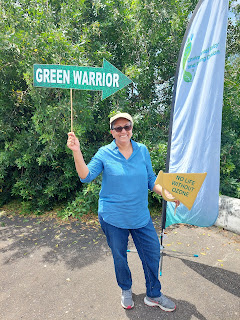The NOU through the Global Environmental Facility Project - Promoting Energy Efficiency in the Refrigeration and Air Conditioning (RAC) Sector distributed Hydrocarbon Training Units to RAC Training Institutions.
RAC Technician Professionally Certified Registry
- Home
- Professional Certification for RAC Sector
- Updated Registry of Professionally Certified Refrigeration & Air-Conditioning Technicians in T&T
- RAC Technicians Corner
- Advisories
- General Documentation and Information for RAC Training Institutions
- Virtual Trainings and Webinars
- Rewards Programme for the Professional Certification Scheme for Refrigeration and Air Conditioning (RAC) Technicians
Thursday 29 September 2022
Wednesday 28 September 2022
Webinar on Good Refrigeration Practices
Tuesday 20 September 2022
Friday 16 September 2022
National Activities for World Ozone Day 2022
The National Ozone Unit recognized World Ozone Day 2022 with a Refresher Training for Trainers in Refrigeration and Air Conditioning, a Public Awareness Display as well as a Webinar on Sustainable Financing for Energy Efficiency
Global Cooperation Protecting Life on Earth- World Ozone Day 2022
Montreal Protocol@35: global cooperation protecting life on earth
In a human lifetime, the mid-thirties can be a time of reflection: to think about what we have achieved and look ahead to what more we can accomplish. It is no different for the Montreal Protocol to Protect the Ozone Layer, the most successful environmental treaty to date.
As the treaty turns 35 on World Ozone Day, we will remember how the Montreal Protocol ended one of the biggest threats ever to face humanity as a whole: the depletion of the ozone layer. When the world found out that ozone-depleting gases used in aerosols and cooling were creating a hole in the sky, they came together. They showed that multilateralism and effective global cooperation worked and they phased out these gases. Now the ozone layer is healing, allowing it once again to shield humanity from the sun’s ultraviolet radiation.
This action has protected millions of people from skin cancer and cataracts over the years since. It allowed vital ecosystems to survive and thrive. It safeguarded life on Earth. And it slowed climate change: if ozone-depleting chemicals had not been banned, we would be looking at a global temperature rise of an additional 2.5°C by the end of this century. This would have been a catastrophe.
In the year of Stockholm+50, marking five decades since the landmark conference that kick-started today’s environmental global movement, the Montreal Protocol has much more to give. Under the Kigali Amendment, nations have committed to phase down hydrofluorocarbons – a move that could avoid up to 0.4°C of global temperature rise by the end of the century. The Protocol and its Amendment are helping the world adopt climate friendly and energy-efficient cooling technology.
What does this mean for humanity? As we continue to protect the ozone layer, it will continue to safeguard us and all life on Earth. It also means a cooler planet as more countries ratify the Amendment. It means more people being able to access vital cooling technology without further warming the planet. It also means the Protocol continuing to send a clear and lasting message: global cooperation to protect life on Earth is our best chance at a brighter future for everyone.
Thursday 15 September 2022
Monday 12 September 2022
Friday 9 September 2022
Discussion on End of Life Management of Refrigerant and Refrigeration and Air Conditioning Equipment
Trinidad and
Tobago is implementing the largest ever grant funded national project under the
Global Environmental Facility (GEF) entitled “Energy
Efficiency through the Development of Low-carbon Refrigeration and Air
Conditioning (RAC) Technologies in Trinidad and Tobago”. This
project, a collaborative effort between the Ministry of Planning and
Development and the United Nations Development Programme (UNDP), seeks to,
amongst other things, assist in the establishment of a structure for ensuring
that the equipment being imported into the country in the RAC industry meets
international standards from an energy efficiency perspective as well as
encourage the move towards low-global warming potential (GWP)) alternative refrigerants. Identified as
crucial to the transition, is the need to ensure that the existing refrigerant gases
are managed properly during servicing, through good refrigeration practices as
well as ensure that they are disposed of in an environmentally sound manner.
To this end, a consultation was held with key stakeholders to discuss a way forward on this issue .
Friday 2 September 2022
Consultations on Draft National Quarantine and Pre Shipment Policy
Trinidad and
Tobago acceded to the Montreal Protocol in 1989, and is committed to the
obligations under the Protocol which are aimed at the phasing-out of chemicals
damaging to the ozone layer. The control of the ozone depleting fumigant methyl
bromide for quarantine and pre shipment use, has been achieved nationally since
January 1, 2015 through successful and ongoing collaboration between the
National Ozone Unit- Ministry of Planning and Development, the Trade Licensing
Unit- Ministry of Trade and Industry, the Pesticides and Toxic Chemicals Inspectorate
- Ministry of Health, and the Plant Quarantine Division, Ministry of
Agriculture Land and Fisheries. Several pieces of legislation are used to
effect the import and export controls of these chemicals, with the Pesticides
and Toxic Chemical Act, Chap. 30:03, Legal Notice # 225 of 1987 – The
Pesticides (Registration and Import Licensing Regulations) 1987, and the Food
and Drugs Regulations specifically employed to control the import and use of
methyl bromide.
Consultations on the Draft Policy have begun with the aim to finalize the document and submit for approval.





















































